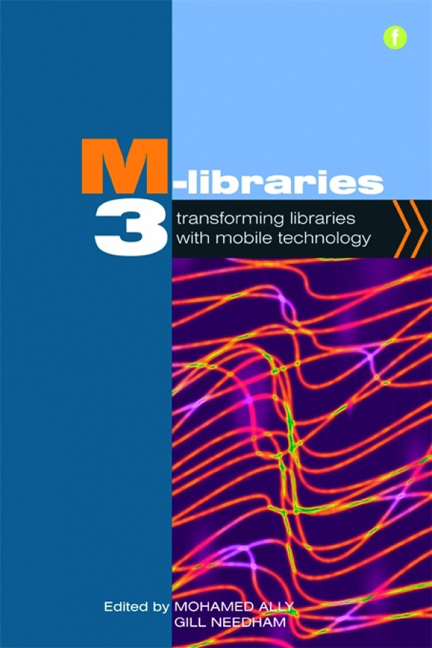Book contents
- Frontmatter
- Contents
- Acknowledgements
- Contributors
- Foreword
- Introduction
- 1 Education for all with mobile technology: the role of libraries
- PART 1 DEVELOPING MOBILE SERVICES
- 2 Preparing for the mobile world: experimenting with changing technologies and applications for library services
- 3 Enhancing open distance learning library services with mobile technologies
- 4 Use of mobile phones in the delivery of consumer health information
- 5 Deploying an e-reader loan service at an online university
- 6 Mobile service providers and library services in a multi-campus library
- 7 Using mobile technology to deliver information in audio format: learning by listening
- 8 Sound selection: podcasts prove positive
- PART 2 PEOPLE AND SKILLS
- PART 3 FOCUS ON TECHNOLOGY
- Conclusion
- Index
2 - Preparing for the mobile world: experimenting with changing technologies and applications for library services
from PART 1 - DEVELOPING MOBILE SERVICES
Published online by Cambridge University Press: 08 June 2018
- Frontmatter
- Contents
- Acknowledgements
- Contributors
- Foreword
- Introduction
- 1 Education for all with mobile technology: the role of libraries
- PART 1 DEVELOPING MOBILE SERVICES
- 2 Preparing for the mobile world: experimenting with changing technologies and applications for library services
- 3 Enhancing open distance learning library services with mobile technologies
- 4 Use of mobile phones in the delivery of consumer health information
- 5 Deploying an e-reader loan service at an online university
- 6 Mobile service providers and library services in a multi-campus library
- 7 Using mobile technology to deliver information in audio format: learning by listening
- 8 Sound selection: podcasts prove positive
- PART 2 PEOPLE AND SKILLS
- PART 3 FOCUS ON TECHNOLOGY
- Conclusion
- Index
Summary
Introduction
The field of mobile technologies is huge. This paper tries to limit discussion to the context of university libraries and the delivery of information resources. However, it is helpful to be informed by the wider educational environment and technology marketplace. We explore: the technology background and technology take-up by university library clients; how libraries have used and are using clientserving technologies; the Deakin University Library (the Library) eresources profile; the Library's adoption of and experimentation with mobile-friendly applications, interfaces and technologies; and some outcomes and conclusions based on current experience and technology evaluations.
Understanding the client technology profile
Understanding library clients and their current use of information technologies is essential to providing services and resources to them effectively, while also enabling knowledgeable advice on mobile technologies and interfaces to be provided within a library context. There has been an exponential increase in the ownership of laptop or netbook PCs by university students and smartphone use has exploded amongst both the student and general population. A great number of undergraduate students have and use laptops, netbooks and smartphones in library spaces. This high take-up of mobile technology by students is evidenced by Australian research at Curtin University of Technology which showed that ‘Three quarters (76%) had laptops or netbooks … Approximately 99% of respondents had mobile phones: three-quarters of those (75%) were web enabled.’ (Oliver and Nikoletatos, 2009, 723).
Data from the USA presented in the ECAR Study of Undergraduate Students and Information Technology, 2010 (Smith and Caruso, 2010), shows the technologies that students own and how they use them, among a surveyed 36,000 undergraduate students from over 120 universities and colleges. This client-profile information for the USA and Australia largely pre-dates the release of the iPad.
The ECAR study (Smith and Caruso, 2010) provides information on the technologies the students were using. Over 80% of students owned a laptop, and over 10% a netbook (close to 89% saturation among undergraduate students), and over 60% of students owned an internetcapable hand-held device (Smith and Caruso, 2010, 9). These would mainly be smartphones and iPod Touch or PDA technology. As the ECAR data collection is 12 months old it is reasonable to expect a greater current take-up of mobile technologies than is indicated in the 2010 figures.
- Type
- Chapter
- Information
- M-Libraries 3Transforming libraries with mobile technology, pp. 13 - 22Publisher: FacetPrint publication year: 2012



